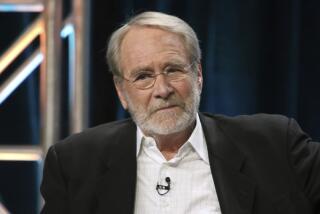The Man With the Immoral Face
- Share via
“Baby, I Don’t Care” is an inspired subtitle for Lee Server’s book. It’s a line from “Out of the Past,” the 1947 film noir (same vintage as the jacket photograph), in which Robert Mitchum’s character is listening to one more cock-and-bull story from Jane Greer, the dishonest beauty who has entranced him, and she wants to know, “You do believe me, don’t you?” But belief, stability and trust have never weighed on Mitchum’s guy as much as mood, self-destruction and being enchanted. “Baby, I don’t care,” he sighs, and it’s a vaulting shift from the mundane to the lyricism of noir’s “bring it all on,” as fatalistic and lovely as one of Charlie Parker’s solos (vintage 1947) or that brave new world’s dread that everything was going to get blown up anyway.
When Robert Mitchum died in 1997 (nearly 80), the significance was partially eclipsed because Jimmy Stewart died the next day. It wasn’t that Stewart was a bigger star, an Oscar-winner and then an honorary Oscar-winner “for his high ideals both on and off the screen” and an altogether more traditional figure. It was more that Mitchum was a threatening fellow who had scorned stardom and himself. He seemed to feel a heady chaos, a love of night for its own sake.
It’s easier now to see how Mitchum was the more interesting, or provocative, of the two. There is so much more to think about with Mitchum--and you can begin with the insolent, ironic, needling gaze on the cover of Server’s valuable book. It’s what Server will later identify as “The Man With the Immoral Face,” and it lets you know why Mitchum is maybe the most important star for an age that is dismantling the old palace called stardom.
Reference books have been vague about the early Mitchum. Though born in New England, in Bridgeport, Conn., in 1917, he seemed to have allegiances to a very different America. There were rumors of youthful vagrancy, and an early taste for writing that got buried in the later tough guy’s belittling of everything about himself, except the size of the drink he’d like.
Server has gone further to penetrate that brief account than any other writer, and he has established the Southern redneck kid, drawn equally to moonshine and books, fast cars and poetry. Look at that cover picture again--just imagine the Mitchum of 1947--and you understand why, 10 years later as he came to write, produce and sing in the strange mythic “Thunder Road,” he asked Elvis Presley to play his kid brother. Elvis was interested, but he ruled himself out by admitting he could only do it if “the Colonel” agreed. Permission was never in the Mitchum genes.
So, yes, he was born in Bridgeport, but only because his father--Scotch-Irish and Native American--had been stationed there in the Army. Mitchum senior was in fact from rural South Carolina, closer to “Cape Fear” country. But he had met a girl in Bridgeport, the child of a Norwegian sea captain, and married her. Robert was born with “somber, torpid eyes that attracted much comment.” When he fell on his head as a small boy, a doctor believed he saw brain damage. You can see it in the eyes, he told the mother. “No, that’s the way they’ve always been,” she replied. By then, the family was back in Charleston, S.C., and Mitchum’s father was killed--crushed--in a Navy yard accident. So the mother took him back to Connecticut and then Delaware. He was sent to a good school, Felton, and he was smart, but he was trouble all the way, and when he defecated in a teacher’s hat, he was expelled.
The family moved to New York, in time for the stock market crash, and then at the age of 14, the kid left home. He would tell stories about running away, but in fact his mother packed for him and maybe reckoned it was the world’s responsibility. He had ambitions of being a hobo riding the rails or, as Server puts it, taking a “boxcar to the promised land.” From 1931 until 1938, Mitchum roamed the land as best he could. He worked for the Civilian Conservation Corps, and he was a stevedore in Long Beach. He also served a short spell on a Georgia chain gang for vagrancy and ran away, his legs raw from chains. He sent a postcard to his mother: “Trouble lies in sullen pools along the road I’ve taken.”
Server does his best with these years, opting for the portrait of a dreamy poetic libertine, a guy who picked up left-wing ideas along with women, liquor and weed--and who encountered a 13-year-old Dorothy, his future wife. There are no pictures of this Mitchum in the book, alas, but he must have been a beauty, and he may have met men bigger, harder and nastier than he was. He wouldn’t be the only very macho Hollywood person who had brushed against the homosexual underworld. I say this if only because acting then, to guys like Mitchum, was a suspect business.
He always liked to give the impression that he acted for one reason only: that if the world was ready to pay him a fortune for doing something so foolish and easy, then why make trouble? In other words, he didn’t care. Yet so often in life he did make trouble. There’s a cult grown up around the legend of Mitchum that savors this attitude--and there are young actors who like the way it justifies their contempt for the system. At the same time, Server gives the best record yet of what he was like as a writer and of how many good directors--Nick Ray, Vicente Minnelli, Charles Laughton--recognized that the guy knew his lines, and others’, and that even if he had caroused the night away, he was camera-fresh at dawn, thoughtful and able to deliver an absolute, natural rightness.
His travels brought him to California. He got involved in theater, playing Duke Mantee in “The Petrified Forest.” And he got into movies, especially Hopalong Cassidy westerns, for United Artists and RKO. Between 1943 and 1947, he made 34 pictures. Then in 1948, though married with two sons, he was caught by the police with starlet Lila Leeds smoking reefers. It was a famous scandal that led to a 60-day sentence (with 10 days off for good conduct). He was close to broke; his marriage nearly foundered. But Howard Hughes gave him a loan and bought out his contract (from David O. Selznick).
Despite his steady infidelity, Dorothy never gave up on him. And the public decided that reefer smoke affirmed all their hopes and dreams about Mitchum.
Of course, for most of his life he was taken for granted--and as he grew older, his sexual menace became too soaked in booze. He was a terrible drinker, and he could be very mean when drunk: If he cared enough about something, he could be very offensive. He had been nominated once for an Oscar, early on, for his soldier in “The Story of GI Joe.” But never again, not even for “The Night of the Hunter,” one of the most daring performances in American film, not just because of its novelty but also for its shifts from terror to farce. It was a picture that showed how much he had learned in the ‘30s, and how much he could care, granted the right context. Server’s book has thin spots (those teenage years), and it prefers not to get too close to Mitchum. So it settles for the anecdotes, the sleepy eyes, the wisecracks and the stoic. But it is a very good book that comes from wide research and many interviews--with professionals and otherwise--who knew Mitchum. We’ll get nothing better--unless in the paperback there is a proper scheme of references that helps explain the book’s rich material.
What can we conclude? Did the guy care, or was he most innovative in guessing that movies were not worth caring about? “The Night of the Hunter” and “Track of the Cat” were the most ambitious pictures he ever made, and the public dismissed them.
On the other hand, it is possible that his truest work is in the RKO films of the ‘40s (including “Crossfire,” “The Big Steal” and “His Kind of Woman”), flicks made quickly and cheaply to pass an hour or two, dreams that give him the right effortless lines--lines like “Prison? Oh, it was Palm Springs without the riffraff,” which is something he really said when let out of the county jail.
I don’t mean to knock Jimmy Stewart, but I’d sooner watch Mitchum, wondering whether he’s a witty thug or a brilliant man trying to hide his light. I’d guess that he knew enough to suspect there was no better way of responding to the camera’s attention than by being enigmatic. But if that’s so, it leaves the movies themselves as something we may have taken too seriously.
More to Read
Sign up for our Book Club newsletter
Get the latest news, events and more from the Los Angeles Times Book Club, and help us get L.A. reading and talking.
You may occasionally receive promotional content from the Los Angeles Times.






